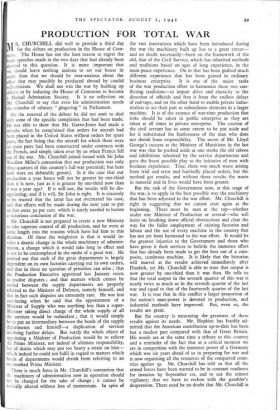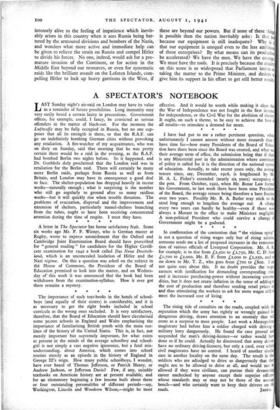PRODUCTION FOR TOTAL WAR
R. CHURCHILL did well to provide a third day for the debate on production in the House of Coco- ons. The House has not the least reason to regret the rank speeches made in the two days that had already been evoted to this question. It is more important that ve ,hould leave nothing undone to set our house in order than that we should be over-anxious about the effect that may possibly be produced abroad by candid self-criticism. We shall not win the war by hushing up defects or by inducing the House of Commons to become a Mutual Admiration Society. It is no reflection on Mr. Churchill to say that even his administration needs the stimulus of salutary " gingering " in Parliament.
On the renewal of the debate he did not omit to deal with some of the specific complaints that had been made.
He was able to show that Mr. Garro-Jones had made a mistake when he complained that orders for aircraft had been placed in the United States without orders for spare parts, the fact being that the aircraft for which there were no spare parts had been constructed under contracts with the French, and simply taken over by us when France fell out of the war. Mr. Churchill joined issued with Sir John Wardlaw Milne's contention that our production was only three-quarters of this country's full war potential; but here both were on debatable ground. Is it the case that our production a year hence will not be greater by one-third than it is now, just as it is greater by one-third now than it was a year ago? If it will not, the results will be dis- appointing; and if it will, Sir John is right. It is sincerely to be trusted that the latter has not overstated his case, and that efforts will be made during the next year to put on that extra 3o per cent. which is surely needed to hasten a victorious conclusion of the war.
Mr. Churchill is not prepared to create a new Ministry to take supreme control of all production, and he went at some length into the reasons which have led him to this decision. Of these the weightiest is that it would in- volve a drastic change in the whole machinery of adminis- tration, a change which it would take long to effect and is not to be contemplated in the midst of a great war. He pointed out that each of the great departments is largely dependent on its own factories carrying out its own orders, and that in these no question of priorities can arise ; that the Production Executive appointed last January exists to resolve disputes ; and that matters which cannot be settled between the supply departments are properly referred to the Minister of Defence, namely himself, and that in fact such disputes are extremely rare. He was less convincing when he said that the appointment of a Minister of Supply who was anything less than a super- Minister taking direct charge of the whole supply of all the services would be redundant ; that it would simply be to put an intermediary between the heads of the supply departments and himself—a duplication of services involving further delays. But surely the whole object of appointing a Minister of Production would be to relieve the Prime Minister, not indeed of ultimate responsibility, but of duties which may put too heavy a strain on him— which indeed he could not fulfil in regard to matters which heads of departments would shrink from referring to an overworked Prime Minister.
There is much force in Mr. Churchill's contention that the machinery of administration now in operation should not be changed for the sake of change ; it cannot be radically altered without loss of momentum. In spite of the vast innovations which have been introduced during the war the machinery built up has to a great extent— and no doubt necessarily—been on the framework of the old, that of the Civil Service, which has inherited methods and traditions based on ages of long experience, in the main peace experience. On to that has been grafted much different experience that has been gained in ordinary business enterprise. It is one of the major tasks of the war production effort to harmonise these two con- flicting traditions—to impart drive and elasticity to the direction of officials and free it from the endless delays of red-tape, and on the other hand to enable private indus- trialists to act their part as subordinate elements in a larger machine. It is of the essence of war-time production that risks should be taken in public enterprise as they are taken at all times in private enterprise. The caution of the civil servant has to some extent to be put aside and for it substituted the fearlessness of the man who does not shrink from responsibility. The secret of Mr. Lloyd George's success at the Ministry of Munitions in the last war was that he pushed aside at one stroke the old taboos and inhibitions inherited by the service departments and gave the freest possible play to the initiative of men with business experience. True, there was much waste arising from trial and error and hurriedly placed orders, but the method got results, and without those results the waste in material and in lives would have been greater.
But the task of the Government now, at this stage of the war, is to apply in the best possible way the machinery that has been adjusted to the war effort. Mr. Churchill is right in suggesting that we cannot start again at the beginning. There must be men at the top—whether under one Minister of Production or several—who will insist on breaking down official obstructions and clear the way for the fuller employment of existing factories and labour and the use of every machine in the country that has not yet been harnessed to the war effort. It would be the greatest injustice to the Government and those who have given it their services to belittle the immense effort that has already been made to get the best out of a com- posite, cumbrous machine. It is likely that the historian will marvel at the results achieved immediately after Dunkirk, yet Mr. Churchill is able to state that output is now greater by one-third than it was then. He tells us that the total output in the seventh quarter of this war is nearly twice as much as in the seventh quarter of the last war and equal to that of the fourteenth quarter of the last war. It is true that in this conflict a larger proportion of the nation's man-power is devoted to production, and industrial methods have improved. But, even so, the results are great.
But the country is measuring the greatness of these results against its needs. Mr. Hopkins has frankly ad- mitted that the American contribution up-to-date has been but a modest part compared with that of Great Britain. His words are at the same time a tribute to this country and a reminder of the fact that at a critical moment we are in competition with the immense power of a Germany which was six years ahead of us in preparing for war and is now organising all the resources of the conquered coun- tries against gs. Mr. Churchill has told us that all the armed forces have been warned to be in constant readiness for invasion by September 1st, and to use the utmost vigilance; that we have to reckon with the gambler's desperation. There need be no doubt that Mr. Churchill is intensely alive to the feeling of impatience which inevit- ably arises in this country when it sees Russia being bat- tered by the armoured divisions and bombers of the Nazis, and wonders what more active and immediate help can be given to relieve the strain on Russia and compel Hitler to divide his forces. No one, indeed, would ask for a pre- mature invasion of the Continent, or for action in the Middle East beyond our resources, or even for systematic raids like the brilliant assault on the Lofoten Islands, com- pelling Hitler to lock up heavy garrisons in the West, if these are beyond our powers. But if none of these things is possible then the nation inevitably asks: Is that no( because our equipment is still inadequate? Why is that our equipment is unequal even to the less ambitious of these enterprises? By what means can its production be accelerated? We have the men. We have the couragt We must have the tools. It is precisely because the anxiety on this score is so widespread that Parliament insists oz taking the matter to the Prime Minister, and desires to give him its support in his effort to get still better results.



























 Previous page
Previous page